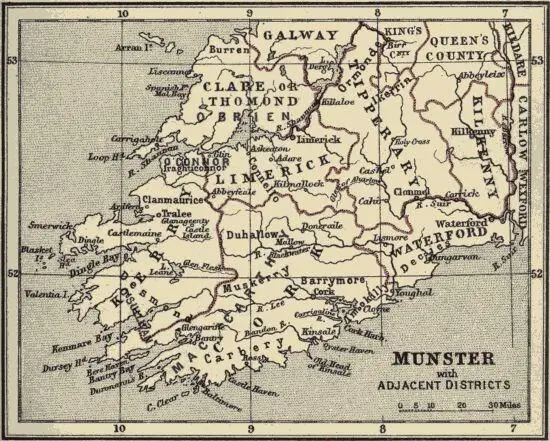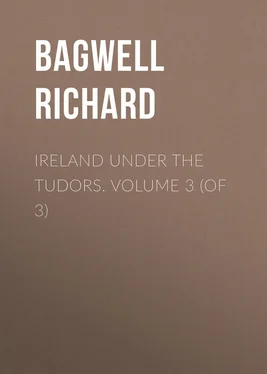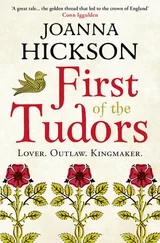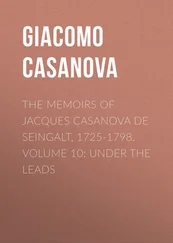Richard Bagwell - Ireland under the Tudors. Volume 3 (of 3)
Здесь есть возможность читать онлайн «Richard Bagwell - Ireland under the Tudors. Volume 3 (of 3)» — ознакомительный отрывок электронной книги совершенно бесплатно, а после прочтения отрывка купить полную версию. В некоторых случаях можно слушать аудио, скачать через торрент в формате fb2 и присутствует краткое содержание. Жанр: foreign_antique, foreign_prose, на английском языке. Описание произведения, (предисловие) а так же отзывы посетителей доступны на портале библиотеки ЛибКат.
- Название:Ireland under the Tudors. Volume 3 (of 3)
- Автор:
- Жанр:
- Год:неизвестен
- ISBN:нет данных
- Рейтинг книги:3 / 5. Голосов: 1
-
Избранное:Добавить в избранное
- Отзывы:
-
Ваша оценка:
- 60
- 1
- 2
- 3
- 4
- 5
Ireland under the Tudors. Volume 3 (of 3): краткое содержание, описание и аннотация
Предлагаем к чтению аннотацию, описание, краткое содержание или предисловие (зависит от того, что написал сам автор книги «Ireland under the Tudors. Volume 3 (of 3)»). Если вы не нашли необходимую информацию о книге — напишите в комментариях, мы постараемся отыскать её.
Ireland under the Tudors. Volume 3 (of 3) — читать онлайн ознакомительный отрывок
Ниже представлен текст книги, разбитый по страницам. Система сохранения места последней прочитанной страницы, позволяет с удобством читать онлайн бесплатно книгу «Ireland under the Tudors. Volume 3 (of 3)», без необходимости каждый раз заново искать на чём Вы остановились. Поставьте закладку, и сможете в любой момент перейти на страницу, на которой закончили чтение.
Интервал:
Закладка:
Fitzmaurice urged Burke to join the Catholic enterprise; he answered that he would be loyal to the Queen, and a fight followed. Burke had but two musketeers with him, one of whom aimed at Fitzmaurice, who was easily known by his yellow doublet. The ball penetrated his chest, and feeling himself mortally wounded, he made a desperate dash forward, killed Theobald Burke and one of his brothers, and then fell, with or without a second wound. ‘He found,’ says Hooker characteristically, ‘that the Pope’s blessings and warrants, his agnus Dei and his grains, had not those virtues to save him as an Irish staff, or a bullet, had to kill him.’ The Burkes returned after the death of their leader, and, having confessed to Dr. Allen, the best of the Geraldines breathed his last. Lest the knowledge of his death should prove fatal to his cause, a kinsman cut off Fitzmaurice’s head and left the bare trunk under an oak – an evidence of haste which shows that there was no great victory to boast of. The body was nevertheless recognised, carried to Kilmallock, and hanged on a gibbet; and the soldiers barbarously amused themselves by shooting at their dead enemy. ‘Well,’ says Russell, ‘there was no remedy – God’s will must be done, punishing the sins of the father in the death of the son. Fitzmaurice made a goodly end of his life (only that he bore arms against his sovereign princess, the Queen of England). His death was the beginning of the decay of the honourable house of Desmond, out of which never issued so brave a man in all perfection, both for qualities of the mind and body, besides the league between him and others for the defence of religion.’ 21 21 Irish Archæological Journal , 3rd S. i. 384; Four Masters ; Camden; Hooker; O’Sullivan, ii. iv. 94. Waterhouse to Walsingham, Aug. 3 and 9, 1579. Fitzmaurice fell shortly before Aug. 20. O’Sullivan calls the place Beal Antha an Bhorin , which may be Barrington’s bridge or Boher. This writer, who loves the marvellous, says a Geraldine named Gibbon Duff, was tended among the bushes by a friendly leech, who bound up his eighteen wounds. A wolf came out of the wood and devoured the dirty bandages, but without touching the helpless man. The Four Masters, who wrote under Charles I., praise Theobald Burke and regret his death.

London: Longmans & Co.
Edwd. Weller, lith.CHAPTER XXXVII.
THE DESMOND REBELLION, 1579-1580
Sir John of Desmond at once assumed the vacant command, and Drury warned the English Government that he was no contemptible enemy, though he had not Fitzmaurice’s power of exciting religious enthusiasm, and had yet to show that he had like skill in protracting a war. The Munster Lords were generally unsound, the means were wanting to withstand any fresh supply of foreigners, and there could be no safety till every spark of rebellion was extinguished. The changes of purpose at Court were indeed more than usually frequent and capricious. English statesmen, who were well informed about foreign intrigues, were always inclined to despise the diversion which Pope or Spaniard might attempt in Ireland; and the Netherlands were very expensive. Moreover, the Queen was amusing herself with Monsieur Simier. Walsingham, however, got leave to send some soldiers to Ireland, and provisions were ordered to be collected at Bristol and Barnstaple. Then came the news that Fitzmaurice had not above 200 or 300 men, and the shipping of stores was countermanded. On the arrival of letters from Ireland, the danger was seen to be greater, and Walsingham was constrained to acknowledge that foreign potentates were concerned, ‘notwithstanding our entertainment of marriage.’ One thousand men were ordered to be instantly raised in Wales, 300 to be got ready at Berwick, extraordinary posts were laid to Holyhead, Tavistock, and Bristol. Money and provisions were promised. Sir John Perrott received a commission, as admiral, to cruise off Ireland with five ships and 1,950 men, and to go against the Scilly pirates when he had nothing better to do. Then Fitzmaurice’s death was announced, and again the spirit of parsimony prevailed. The soldiers, who were actually on board, were ordered to disembark. These poor wretches, the paupers and vagrants of Somersetshire, and as such selected by the justices, had been more than a fortnight at Bristol, living on bare rations at sixpence a day, and Wallop with great difficulty procured an allowance of a halfpenny a mile to get them home. The troops despatched from Barnstaple were intercepted at Ilfracombe, and all the provisions collected were ordered to be dispersed. Then again the mood changed, and the Devonshire men were allowed to go. 22 22 Drury to Walsingham, Aug. 23, 1579; Walsingham’s letters of Aug. 5, 6, and 7; E. Tremayne to Burghley, Aug. 5; Proportions of victual, &c. Aug. 24; Wallop to Walsingham, Aug. 27, and Sept. 3, 4, and 14; Instructions to Sir John Perrott, Aug. 19.
The Earl of Kildare, who was probably anxious to avoid fresh suspicion, gave active help to the Irish government, ‘making,’ as Waterhouse testified, ‘no shew to pity names or kindred.’ He exerted his influence with the gentry of the Pale to provide for victualling the army, and he accompanied the Lord Justice in person on his journey to Munster. The Queen wrote him a special letter of thanks, and Drury declared that he found him constant and resolute to spend his life in the quarrel. The means at the Lord Justice’s disposal were scanty enough: – 400 foot, of which some were in garrison, and 200 horse. He himself was extremely ill, but struggled on from Limerick to Cork, and from Cork to Kilmallock, finding little help and much sullen opposition; but the arrival of Perrott, with four ships, at Baltimore seemed security enough against foreign reinforcements to the rebels, and Maltby prevented John of Desmond from communicating with Connaught. Sanders contrived to send letters, but one received by Ulick Burke was forwarded, after some delay, to the government, and Desmond still wavered, though the Doctor tried to persuade him that Fitzmaurice’s death was a provision of God for his fame. ‘That devilish traitor Sanders,’ wrote Chancellor Gerrard, ‘I hear – by examination of some persons who were in the forts with him and heard his four or five masses a day – that he persuaded all men that it is lawful to kill any English Protestants, and that he hath authority to warrant all such from the Pope, and absolution to all who can so draw blood; and how deeply this is rooted in the traitors’ hearts may appear by John of Desmond’s cruelty, hanging poor men of Chester, the best pilots in these parts, taken by James, and in hold with John, whom he so executed maintenant upon the understanding of James his death.’ No one, for love or money, would arrest Sanders, and Drury could only hope that the soldiers might take him by chance, or that ‘some false brother’ might betray him. Desmond came to the camp at Kilmallock, but would not, or could not, do any service. Drury had him arrested on suspicion, and, according to English accounts, he made great professions of loyalty before he was liberated. The Irish annalists say his professions were voluntary, that he was promised immunity for his territory in return, and that the bargain was broken by the English. Between the two versions it is impossible to decide. The Earl did accompany Drury on an expedition intended to drive John of Desmond out of the great wood on the borders of Cork and Limerick. At the place now called Springfield, the English were worsted in a chance encounter, their Connaught allies running away rather than fight against the Geraldines. In this inglorious fray fell two tried old captains and a lieutenant, who had fought in the Netherlands, and the total loss was considerable. Drury’s health broke down after this, and instead of scouring Aherlow Woods the stout old soldier was carried in a litter to his deathbed at Waterford. As he passed through Tipperary, Lady Desmond came to him and gave up her only son as a hostage – an unfortunate child who was destined to be the victim of state policy.
Читать дальшеИнтервал:
Закладка:
Похожие книги на «Ireland under the Tudors. Volume 3 (of 3)»
Представляем Вашему вниманию похожие книги на «Ireland under the Tudors. Volume 3 (of 3)» списком для выбора. Мы отобрали схожую по названию и смыслу литературу в надежде предоставить читателям больше вариантов отыскать новые, интересные, ещё непрочитанные произведения.
Обсуждение, отзывы о книге «Ireland under the Tudors. Volume 3 (of 3)» и просто собственные мнения читателей. Оставьте ваши комментарии, напишите, что Вы думаете о произведении, его смысле или главных героях. Укажите что конкретно понравилось, а что нет, и почему Вы так считаете.












